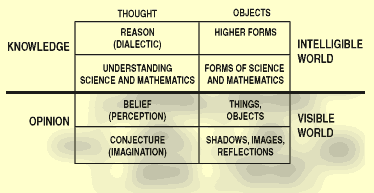Plato's Line
Philosophy Organizes Thought

How would the diagram be drawn to include the linguistics of Finnegans Wake (macaronic puns)?

"In the epics, nous refers to general intelligence, including accurate
perception and practical effectiveness. Thus, 'bold Hektor' is advised to refrain
from pushing the battle forward at an inopportune time. After arguing that one man
cannot have all gifts (that some fight, others dance), Poulydamas counsels at
Iliad XIII:
and in the breast of another Zeus of the wide brows establishes wisdom, a lordly
thing, and many take profit beside him and he saves many, but the man's own thought
(noon) surpasses all others. (Lattimore translation).
And when Eumaios speaks despairingly to Odysseus, the latter at once 'had an idea
(noon) in his mind' (Book XIV, 1). Recalling the intimate relation of
nous to being in Parmenides, one can discern the outline of a path which
begins
with nous as a widely conceived and applied general intelligence and narrows
to its role as pure intellect beholding the pure forms."
Bernard Freydberg, Provocative Form in Plato, Kant, Nietzsche (and Others), Peter Lang, 2000: 19.

How would the diagram be drawn to include the linguistics of Finnegans Wake (macaronic puns)?